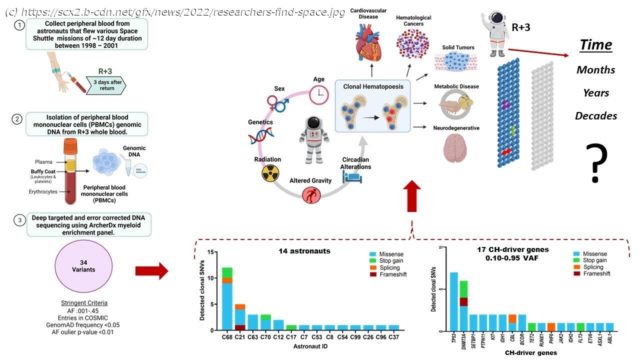Astronauts are at higher risk for developing mutations—possibly linked to spaceflight—that can increase the risk of developing cancer and heart disease during their lifetimes, according to a first-of-its kind study from the Icahn School of Medicine at Mount Sinai.
August 31, 2022
Astronauts are at higher risk for developing mutations—possibly linked to spaceflight—that can increase the risk of developing cancer and heart disease during their lifetimes, according to a first-of-its kind study from the Icahn School of Medicine at Mount Sinai.
A team of researchers collected blood samples from National Aeronautics and Space Administration (NASA) astronauts who flew space shuttle missions between 1998 and 2001. They discovered DNA mutations, known as somatic mutations, in the blood-forming system (hematopoietic stem cells) in all 14 astronauts studied.
Their findings, published in the August issue of Communications Biology, suggest that spaceflight could be associated with these mutations and emphasize the importance of ongoing blood screening of astronauts throughout their careers and during their retirement to monitor their health.
Somatic mutations are mutations that occur after a person is conceived and in cells other than sperm or egg cells, meaning they cannot be passed on to offspring. The mutations identified in this study were characterized by the overrepresentation of blood cells derived from a single clone, a process called clonal hematopoiesis (CH).
Such mutations are frequently caused by environmental factors, such as exposure to ultraviolet radiation or certain chemicals, and may be a result of cancer chemo- or radiotherapy. There are few signs or symptoms associated with CH; most patients are identified after genetic testing of their blood for other diseases. Although CH is not necessarily an indicator of disease, it is associated with a higher risk for cardiovascular disease and blood cancer.
“Astronauts work in an extreme environment where many factors can result in somatic mutations, most importantly space radiation, which means there is a risk that these mutations could develop into clonal hematopoiesis. Given the growing interest in both commercial spaceflights and deep space exploration, and the potential health risks of exposure to various harmful factors that are associated with repeated or long-duration exploration space missions, such as a trip to Mars, we decided to explore, retrospectively, somatic mutation in the cohort of 14 astronauts,” said the study’s lead author David Goukassian, MD, Professor of Medicine (Cardiology) with the Cardiovascular Research Institute at Icahn Mount Sinai.






